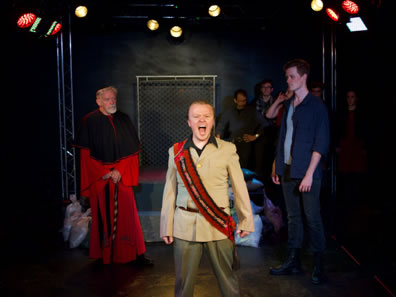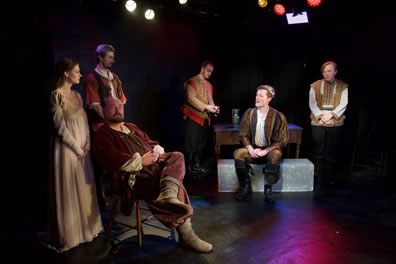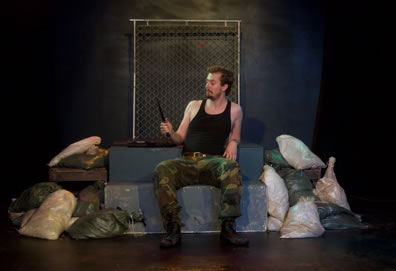King John / The Lion in Winter
The Common Roar
4615 Theatre Company, The Highwood Theatre, Silver Spring, Maryland
Saturday, August 5, 2017, side row, front corner of black box
Directed by Jordan Friend
It starts with a roar—actually, it starts with a yawn, but such is a father's yawn, a sudden bellowing (as are a father's sneezes, coughing fits, and farts) to fright the pride (but not their own pride).
It ends with a dead king and a nation emerging from chaos—actually, it ends with a theatrical conundrum: the bastardizing of the Bastard.
The whole is a journey through two plays, William Shakespeare's King John and James Goldman's The Lion in Winter, in which the sequel comes first, the present play is past, the past play present, and a young theater company shows its muscle while still learning the walk.


Top, King John (Seth Rosenke, center) proclaims against the Pope as Cardinal Pandulph (John Burghardt) and King Philip (Brandon McMahon) look on in William Shakespeare's King John. Above, King Philip, sitting center, parlays with King Henry II (Nick Torres, seated left) as, from left, Alais (Morgan Sendek), Richard (James Allen Kerr), Geoffrey (Charlie Cook), and Prince John (Rosenke) tend them in James Goldman's The Lion in Winter, the two plays combining in 4615 Theatre Company's repertory. Below, Philip the Bastard (Kerr) rails against commodity in King John. Photos by Anne Donnelly, 4615 Theatre Company.
4615 Theatre Company's repertory staging of these two plays is not a new idea (this website has a review of the American Shakespeare Center's similar repertory at the Blackfriars Playhouse in 2012). The pairing at least serves as an interesting theatrical enterprise: two works of two eras (one written in the 1590s, the other in 1966) portraying the same Plantagenet family. The two plays share three characters: John, Eleanor of Aquitaine, and France's King Philip, while two characters in King John, Philip the Bastard and young Arthur, are sons of John's elder brothers in The Lion in Winter, Richard the Lionhearted and Geoffrey.
Nevertheless, the plays have more dissimilarities than connections. King John is an unpopular but underrated Shakespearean historical dramedy focusing almost entirely on matters of succession, loyalty, church, and state. The Lion in Winter is a popular but overrated soap opera focusing almost entirely on matters of marriage, sex, parenting, and parent-baiting. King John has its familial concerns—Constance is one of the greatest stage moms in theater history—while The Lion in Winter ostensibly is a play grounded in political maneuvering. "I talk people and you answer back in provinces," Alais complains to King Henry II; "They get mixed up," he replies. However, Goldman's play is a modern domestic shoutfest with opaque characters, whereas Shakespeare's play is a nationalistic pageant of vivacious verse and a couple of the most engaging characters in his canon (striding through a somewhat disjointed dramatic landscape, I grant).
Helming both productions is Jordan Friend, 4615's founding artistic director. 4615 was formed in 2013 by a group of young, not-yet-established theater artists in the Washington, D.C., area seeking their own creative outlet by staging classic and "provocative, contemporary" plays. The company already is generating buzz across the Capitol Region (this website reviewed its production of Shakespeare's Love's Labour's Lost last year), and Friend is gaining a reputation as a theater visionary. He had told me of his approach to King John and the two-play repertory, so when our calendar unexpectedly opened up, we trekked to the Highwood Theatre's 31-seat black box play space in Silver Spring on the final day of the repertory's run.
The Lion in Winter led off in the matinee slot, and in Friend's hands the play comes off better than I recall the piece. Costume Designer Jeannette Christensen dresses the English king and his sons in what is meant to be medieval regal grandeur, yet it bespeaks careworn rusticity, and Eleanor wears a simple but sexy-shaped black gown with fur shoulder cuffs. The provincial nature of the English royalty contrasts with more cosmopolitan look of King Philip (Brendan McMahon playing the young French king as cocky-beyond-his-maturity) in his finely tailored, gold brocade jacket and britches with cavalier riding boots. Friend works the small play space well, bringing characters in and out past the audience. For scene changes (Nathaniel Sharer's design features simple props of tables, chairs, chests, and benches), the cast members move and remove furniture while remaining in character, eyeing each other suspiciously, conspiratorially, or despicably depending on the state of their relationship at that particular moment. E-hui Woo's lighting design is mesmerizingly effective in isolating characters for their moments of self-reflection (as if truth is finally shining through to the audience).
Veteran actor Nick Torres as King Henry II gives a subtly understated performance, from his opening roar, er, yawn, to his final lines as he his congenially sends his most hated enemy, his wife Eleanor (Peg Nichols), back to her imprisonment. He's a king, true, and he's a master politician; but most of all he's a father, an exasperated one. "My life, when it is written, will read better than it lived," he says, Torres turning an anachronistically prophetic joke into a weary resignation many a father can relate to. For all the bile Henry and Eleanor verbally fire at each other and their repeated assertions that their love for each other died long ago, Nichols and Torres display genuine affection and attraction at the root of their ongoing mutual respect. "He came down from the North to Paris with a mind like Aristotle's and a form like mortal sin," she says. "We shattered the Commandments on the spot." Nichols delivers this line—with a tone of pleasurable reminiscing—to her spiteful son Richard (James Allen Kerr), so it could be one big fib. However, though Torres is not on stage in this moment, in all his scenes with Nichols' Eleanor, we sense the vibrations of those shattered Commandments still humming through his body—and hers, too.
Charlie Cook turns in a notable peformance playing middle son Prince Geoffrey as a slymaster who loves his conniving capabilities so much he ends up enmeshing himself. Also fun to watch is Seth Rosenke as the guilelessly vile Prince John. Upon Eleanor's arrival at Chinon Castle, she strokes John's hair to make it more orderly, but as she turns to greet Richard, John tousles his bangs back to disorder. This and his carrying a little plush lion forecast the John who takes the throne in the day's next play (that toy lion ends up in the hands of his son, Prince Henry, in Shakespeare's play).
Friend's most provocative production aesthete with King John is setting it in modern dress (designed by Christensen). Among the characters carrying over from the period-dress Lion in Winter, Eleanor is now wearing a purple cocktail dress, France's King Philip is in blue jeans and an unbuttoned blue work shirt over light blue tee, and John wears a military uniform with a sash, a gold-plated pistol that serves as his royal seal, and a chest full of medals (for what action, exactly? That question could be the point of the display). The late Richard's bastard son, Philip (Kerr), dons camouflage pants and a black tank t-shirt. Another notable outfit is Arthur's (Will Anderson), in schoolboy jacket and short pants. Sharer's scenic design centers on the throne sitting on a two-step platform at the back of the stage with chain-link fence behind and sandbags at the base. After the wedding between Dauphin (Jack Russ) and King John's niece Blanche (Morgan Sendek, who plays Alais in The Lion in Winter), which brokers a peace between France and England, the Pope's legate, Cardinal Pandulph (John Burghardt), arrives with the soundtrack of a helicopter. The effect is to cast Goldman's modern play as a fairy tale while Shakespeare's blank verse epic has more current resonance, profiling as it does a maturity-stunted king with little if any acumen for ruling who relies on bombast over legislated policy and tends to go off the rails when he gets on an angry tangent.
However, while the company generally speak Shakespeare's verse with fluid clarity and authority, Friend seems less surefooted in his staging of Shakespeare's convoluted plot wending through the play's proclamatory exegeses. Other than fight scenes, the action is more stilted than in Lion in Winter to the point that Friend's blocking of scenes sometimes has literal application, blocking the views of audience members for prolonged passages. Friend also resorts to nontextual visual interpolations. He has Arthur, who has a legitimate claim to John's crown, show up at John's first coronation. At the second coronation, a mysterious cloaked monk slinks in and hands John a goblet from which the king inexplicably drinks: it contains the poison that eventually kills him (Friend told me he picked that moment for the poisoning rather than the play's penultimate scene when Shakespeare first mentions it because John's verse structure begins fraying from that point on, though this could also be explained by John's increasing insecurity and paranoia). Friend also inserts a scene, shortly after news comes of Eleanor's death, in which John is haunted by the specters of Arthur, Eleanor, and King Philip of France, the last revealing himself as the monk who poisoned John, a completely nontextual interpretation, even if you throw Lion in Winter into the mix.
Rosenke continues his Lion in Winter portrayal of Prince John all grown up (physically, if not emotionally) and now a king instead of the runt constantly maligned by his brothers and mother. In a portrayal of mannerisms (for two of his three coronations, he walks in, snaps his arms out to his side as if adjusting his posture and that of his uniform jacket, runs a hand through his hair, then has someone adjust his uniform) and expressions (everything is a joke to him until his kingdom is falling apart, whereupon he tries to bully away his own insecurities) along with his excellent command of Shakespeare's verse, Rosenke's John is complexly compelling, even though he's presented as a real snot. When he wishes the captured Arthur killed, he attempts to move Arthur's jailer, Hubert (Torres) without actually expressing his purpose. However, the only panache this John has is in his own mind. After 50 lines of John believing he's carrying off brilliant subterfuge, Hubert promises only to keep Arthur "so that he shall not offend your majesty." "Death," John says at last, Rosenke making clear that he has concluded Hubert to be a complete dolt. "My lord?" Hubert replies, taken back. "A grave," says John, like, really? "He shall not live," Hubert says. "Enough," John says, Rosenke back in subterfuge mode: "I could be merry now. Hubert, I love thee. Well, I'll not say what I intend for thee." John pauses and poises a finger with significant meaninglessness and says, "Remember."
Rosenke is not alone in his stellar work in this play. Jacqueline Chenault is a freight train of emotion as Constance, a one-track stage mom whose histrionics blow through every scene she's in; yet when her son Arthur is captured and, as everybody knows, destined to die, her histrionics carry all-consuming grief and fear. "You hold too heinous a respect of grief," Cardinal Pandulph tells her. "He talks to me that never had a son," she rejoins with an aching resonance that lands in our hearts. "Had you such a loss as I, I could give better comfort than you do." Amen. Anderson, meanwhile, manages to win our respect for the ultrainnocent, sweet-hearted Arthur who doesn't really want to be king and hates the violent fuss being made over him. While he can't convince his selfishly opportunistic mother to back off, he does turn Hubert to his side even as the jailor is about to singe the prince's eyes with a hot iron poker in a prelude to killing him. Making Arthur a believable role rests on how effectively Anderson and Torres play Hubert's transformation.
 Kerr plays Philip the Bastard with glint-eyed enthusiasm, exactly opposite his soldierly serious take on Prince Richard in The Lion in Winter. The Bastard is one of Shakespeare's greatest creations, a cross of King Lear's Kent and Two Gentlemen of Verona's Lance with Falstaff's social cynicism thrown into the mix. Kerr has great fun with the role, even as the Bastard takes on a greater thematic role in the play's second half as the plot pivots through selfish royal and papal shenanigans and the English lords' roller-coaster loyalties. Kerr caps his portrayal, and this production, with a piece of tacked-on stage business after delivering the play's final speech, lingering after the rest of the court leaves, then stepping up to John's dead body sitting in the throne. Kerr's Bastard takes the crown and pretends to put it on his own head, smirks at the audience, then he starts off stage, remembers something, and sheepishly takes the broadsword to carry off for the coronation, a casual clown to the end.
Kerr plays Philip the Bastard with glint-eyed enthusiasm, exactly opposite his soldierly serious take on Prince Richard in The Lion in Winter. The Bastard is one of Shakespeare's greatest creations, a cross of King Lear's Kent and Two Gentlemen of Verona's Lance with Falstaff's social cynicism thrown into the mix. Kerr has great fun with the role, even as the Bastard takes on a greater thematic role in the play's second half as the plot pivots through selfish royal and papal shenanigans and the English lords' roller-coaster loyalties. Kerr caps his portrayal, and this production, with a piece of tacked-on stage business after delivering the play's final speech, lingering after the rest of the court leaves, then stepping up to John's dead body sitting in the throne. Kerr's Bastard takes the crown and pretends to put it on his own head, smirks at the audience, then he starts off stage, remembers something, and sheepishly takes the broadsword to carry off for the coronation, a casual clown to the end.
This lightens the significance Shakespeare gives the Bastard, a fictionalized character of his own creation. By the final scene, Philip the Bastard is the most powerful and battle-skilled man in England, commanding greater authority than even King John—even the other lords are scared of him. The dying King John's heir, Prince Henry, is a young boy, a situation ripe for the Bastard to make a play for the crown, staking his claim as King Richard the Lionhearted's only son (Philip having been publicly acknowledged as such by his own mother, and knighted in that name by King John). Who would resist? Nevertheless, when John dies on stage sitting in his chair, the Bastard turns to Henry, kneels and hails him as the new king. This is in keeping with his unwavering sense of duty to his nation (and whoever wears its crown), which he expresses in the play's final speech:
This England never did, nor never shall,
Lie at the proud foot of a conqueror,
But when it first did help to wound itself.
Now these her princes are come home again,
Come the three corners of the world in arms,
And we shall shock them. Nought shall make us rue,
If England to itself do rest but true.
We come to the end of a day of plays in which government has been portrayed as the personal self-interests of those with wealth and name. "A nation is a human thing; it does what we do, for our reasons," England's King Henry tells France's King Philip early in The Lion in Winter. For the rest of that play and through King John we see spoiled men and women in the roles of rulers wrangling over their own worth at the cost of commoners who have to die (and kill) for those self-interests. Shakespeare, however, gives us Philip the Bastard preaching about honor and railing at "commodity" but maintaining unwavering devotion to his nation; and he gives the Bastard the last word and the lasting image of the "commoner" with the common sense and courage necessary for true, effective government.
Even today, that is no lark.
Eric Minton
August 25, 2017
Comment: e-mail [email protected].
Start a discussion in the Bardroom



 Find additional Shakespeareances
Find additional Shakespeareances